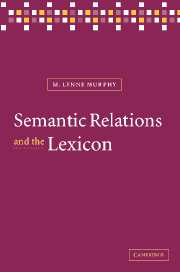Book contents
3 - Other approaches
Published online by Cambridge University Press: 22 September 2009
Summary
I do not believe in things, I believe only in their relationship.
Georges Braque (quoted in Jakobson 1962: 632)In the last chapter, I proposed that paradigmatic relations among words relate conceptual representations of words, rather than linguistic representations in a modular lexicon. That approach is founded upon the assumptions that (a) relations among words can be studied as cognitive phenomena, (b) relations must be interpreted with respect to their linguistic use, (c) nonlinguistic context is relevant to these relations, and (d) definitional and encyclopedic aspects of meaning cannot be neatly separated. This chapter surveys other approaches to paradigmatic semantic relations, starting (in 3.1) with a historical survey of the role of these relations in five disciplines: philosophy, anthropology, linguistics, psychology, and computer science. The approaches to semantic relations in these disciplines frequently overlap, and so three (cross-disciplinary) categories of approaches are critically discussed in the following sections. Section 3.2 concerns those approaches that treat lexical meaning as composed of features or primitives. In these theories, semantic relations arise from the similarities and differences among words᾽ internal semantic structures. In 3.4 we look at approaches in which word meanings are not defined. In these cases, semantic relations must be explicitly stated in the lexicon or semantic memory. Between these two extremes, the approaches in 3.3 have it both ways: defining words in the lexicon and explicitly representing semantic relations among words.
- Type
- Chapter
- Information
- Semantic Relations and the LexiconAntonymy, Synonymy and other Paradigms, pp. 61 - 130Publisher: Cambridge University PressPrint publication year: 2003



